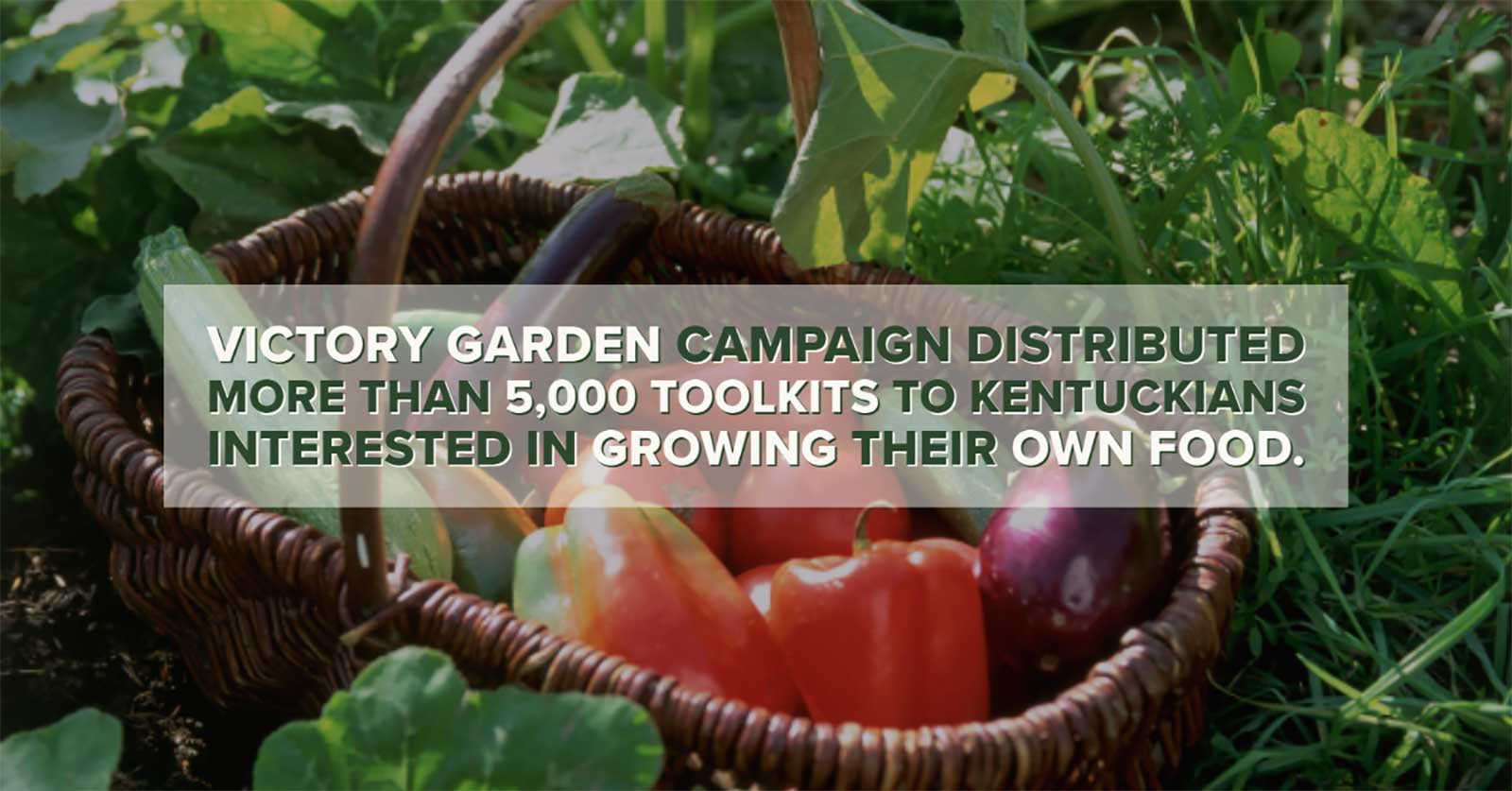
NOV
Gardens, either container or standard, surge in popularity this summer
Agriculture Commissioner, other partners urged Kentuckians to grow Victory Gardens
FRANKFORT (Nov. 23, 2020) – This summer, Agriculture Commissioner Dr. Ryan Quarles encouraged people to get their hands dirty and get in touch with their agricultural roots. The Kentucky Department of Agriculture (KDA) teamed up with the University of Kentucky’s (UK) Cooperative Extension Service and Kentucky’s Nutrition Education Program (KYNEP) to motivate Kentuckians to plant a Victory Garden and enjoy the fruits and vegetables of their labor.
“Since starting the Kentucky Hunger Initiative years ago, the Kentucky Department of Agriculture had kicked around the idea of a new agricultural education effort to encourage Kentuckians to grow their own victory gardens,” Commissioner Quarles said. “With people spending more time at home during the coronavirus pandemic, this seemed like the perfect opportunity to sprout this idea.”
Garden surveys around the state show the idea took root, with about 45 percent of garden growers saying this summer was their first time growing a garden, whether standard or container. That percentage is up from the 2019 survey that showed 34 percent of respondents were first-time gardeners.
Quarles and KDA saw the need shortly after the start of the pandemic. People reached out in large numbers asking for advice on growing their own food. KDA’s partnership with the University of Kentucky was a natural fit to educate these would-be gardeners and teach them the value of creating their own food source. It is also the perfect way to learn an appreciation for agriculture.
“Whether they were urban or rural, those who got their hands dirty starting their own garden, learned the basics about agriculture,” Quarles said.
UK’s Cooperative Extension Service, which has offices in all of Kentucky’s 120 counties, distributed more than 5,000 of the Kentucky Victory Garden toolkits developed by KYNEP. The kits, which contained garden supplies, as well as recipe cards on how to properly wash and prepare the fruits and vegetables grown, were handed out at Farmer’s Markets, Extension offices and plant giveaways.
Respondents to the garden surveys reported having more time this year to plant a garden. They also enjoyed the idea of growing their own food and saving money at the grocery store. Many reported planting gardens with children and sharing the love of growing food with the next generation. They also froze, canned or dried their harvest for later use. These gardens produced a variety of vegetables including tomatoes, peppers, corn and beans.
“With a resurgence in popularity, home gardening during the pandemic not only helped ease concern over potential food shortages but also increased fruit and vegetable consumption,” KYNEP Director Marisa Aull said. “Our goal is to make the healthy choice the easier choice and help Kentuckians live a healthier lifestyle and we are thankful for the partnership with Commissioner Quarles and the Kentucky Department of Agriculture to help us reach communities all across the bluegrass.”
“2020 has presented several unique challenges; however, it has also allowed for creative and innovative programming opportunities,” said Dr. Jennifer Hunter, Assistant Director of UK’s Family Consumer Sciences Division. “The 2020 Victory Garden Campaign in partnership with the Kentucky Department of Agriculture is an excellent example of such programming. The Victory Garden campaign allowed the University of Kentucky Cooperative Extension Service to provide families across the Commonwealth with resources and materials to not only successfully grow their own backyard garden but to learn new nutrition and cooking skills.”
The University of Kentucky College of Agriculture, Food and Environment was founded as, and remains, a land-grant institution, committed to improving the quality of life for Kentuckians. Our research, teaching, and extension programs are part of a national system that maintains a statewide presence and links local, state, and global issues. Agriculture, food, and environmental systems are key components of Kentucky's economic future, and the college is playing a prominent role in those areas with its programs.
The Kentucky Nutrition Education Program (KYNEP) encompasses two separate USDA programs: The Expanded Food and Nutrition Education Program and the Supplemental Nutrition Assistance Program. Both programs are administered by the University of Kentucky Cooperative Extension Service in order to show limited resource families with young children and SNAP eligible individuals how to plan nutritious meals on a limited budget, acquire safe food handling practices, improve food preparation skills, and change behavior necessary to have a healthy lifestyle.

